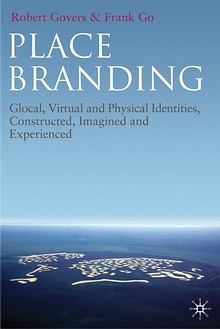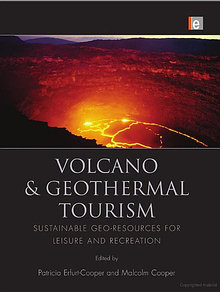 Volcano and Geothermal Tourism. Sustainable Geo-resources for Leisure and Recreation
Volcano and Geothermal Tourism. Sustainable Geo-resources for Leisure and Recreation
Edited by Patricia Erfurt-Cooper and Malcolm Cooper
(Hardback, 320 pages, 2010, Earthscan)
Edited by Patricia Erfurt-Cooper, Lecturer in Tourism Resource Management at Ritsumeikan Asia Pacific University and Dr Malcolm Cooper, Professor of Tourism Management at the same university in Japan, a country famous for its volcanism but also, as we learn, for its professional management of volcanic attractions for tourism & leisure and its advanced security management culture.
It is a collective work by 21 contributors, specializing in specific volcanic destinations and ranging from volcanologists, geologists and other environmental scientists to specialist photographers, volcano tour operators to tourism academics and consultants.
Volcano tourism, as developed in the book, seems to be an easy to define adjectival tourism, which is of course linked to adventure tourism, ecotourism (e.g. Arenal National park in Costa Rica), dark tourism (e.g. the site of Pompei), and spa tourism among others. There are at least 1,300 volcanoes active worldwide but vary greatly in terms of tourism development: some are mature package tourist destinations such as Mt Etna & Santorini, popular domestic tourism leisure sites such as Blue Lagoon in Iceland, and other sites as remote that can only be visited by helicopter as Kamtchatka's Valley of the Geysers. Beyond location specific information, the book offers some thought-provoking, first-hand material: volcanoes not only threaten, but their more fragile feature such as lava tubes can be threatened by land and tree clearing, pollution and human usage – "at the end of the tour, the ranger asks tour participants not to share the location of the lava tube with others, to please keep it secret' (p.75). There is also a general threat from CO2 in locations such as health spas/thermal springs and in poor vented hotel rooms in high seepage areas. Volcanotourists have died from inhaling Sulphur dioxide in Japan and from hot gas ('volcanic laze') in Hawaii. At the same time there are no international safety guidelines for volcanic tourism and the editors argue in favour of setting some up, using the Japanese experience.
Organised into 5 parts, 22 chapters and 19 case studies (some of which are very informative like the case studies on Japanese volcanoes, others like those on Mexican or Greek Volcanoes are very short and data-poor) case studies discussing existing and necessary risk-management policies, also identifying gaps in the management and tourism infrastructure of each volcanic attraction. Part I reviews existing literature, Part II deals volcano tourism along Africa's Rift Valley, from Ethiopia to the Congo and Tanzania. Part III covers the Americas and Hawaii with its 'benevolent' volcanism and the 'world's most valuable' but also 'endangered' lava tubes, while Part IV deals with the highly active and potentially dangerous volcanoes of Asia. Part V deals with largely 'dormant' Europe (with the notable exception of Iceland of course) and Part VI deals with highly volcanically active Oceania.
Most maps could have been more detailed, however there are a number of useful tables and a good selection of black & white photos as well as a few colour ones . A most characteristic is a photo of a sign in Kyushu, Japan: 'if you fall in the pond, you will be boiled'). Observant photo captions note "the armed guards in the background", a bulldozer which "breaks through the roof and falls into the lava tube" and juicy passages such as "the [Vesuvius] park officers indicated that their single greatest struggle is in levering away the influence of the Camorra and their extraction of revenues to the hidden economy." revealing various sources of dangers and thrilling opportunities...
It is the first major academic publication and global review on volcano tourism and as such it could form a basis for an undergraduate specialist academic course. In fact, with the addition of some practical info it could have also served as a good specialist guidebook. To date there is little research into volcano tourism, and this volume fills a gap in an apparently steadily growing tourism segment.
For more details and to order visit the publishers website - Book Preview
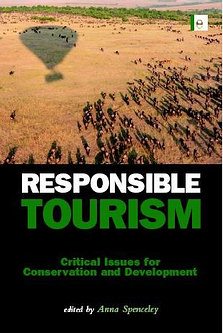 Responsible Tourism, Critical Issues for Conservation and Development
Responsible Tourism, Critical Issues for Conservation and Development
Edited by Anna Spenceley
(Paperback, 416 pages, 2010, Earthscan - first published in hardback in 2008)
The volume, edited by Dr Anna Spenceley who is an independent tourism consultant and researcher based in South Africa and a director of the International Centre for Responsible Tourism – South Africa, focuses on Southern Africa, Conservation & Development.
There are Case Studies from South Africa, also Mozambique, Madagascar, Botswana, Zambia, Namibia, contributed by 18 experts mostly tourism consultants & practitioners. Papers were reviewed by well-known tourism experts, mostly academic. The compilation was supported by the Transboundary Protected Areas Research Initiative and the IUCN Southern African Sustainable Use Specialist Group and the National Research Foundation of South Africa.
Although there is a rather sectarian treatment of Ecotourism in the introduction (and a typing error stating the "international year of ecotourism" as 1992 rather than 2002), there are good chapters dedicated to Ecotourism by well-known proponents such as Hitesh Mehta.
The book is structured into 3 main sections: Part one covers policies, institutional interventions & 'market forces' and discusses tourism & poverty reduction in Mozambique (unsuccessful , corruption, responsibility deferred to NGOs and Associations), Ecotourism policy and planning in Madagascar (hampered by 'a difficult investment climate'), public-private partnerships in South African national parks (SanParks is a commercialisation 'success case'), GTZ German Development Agency's experience in South Africa (mixed, argues for community-private partnerships) , South African national policy & demand for responsible tourism (safety issues, skills shortage), and a case study of a 'corporately responsible' South African tourism group which has run into some controversy in Botswana lately.
Another six chapters in Part two cover 'responsible nature-based tourism' discussing its implications in southern Africa (non-hunting tourism has a higher economic multiplier than trophy hunting), the economics of wildlife tourism in southern Africa, the economics of transboundary protected areas (not sufficient to tackle high poverty and inequality), wildlife tourism and conservation in Botswana (favourably reviews Community Based Organisations or 'Trusts' confusingly includes trophy hunting under ecotourism, finds that the latter is still in its infancy and involves misappropriation of funds), the Botswana's Okavango safari lodge sector (expat white ownership & skilled employment, black unskilled labourers, new 'pro-poor practices sit uncomfortably in a sector steeped in the imagery of colonialism on land formerly occupied by the rural poor'), the impacts of luxury nature-based tourism on rural poverty (not so clear) , and the local economic impact of South Africa's Madikwe Game Reserve ('brings opportunities and substantial income to a once marginal area' ).
Part 3 reviews the impact of 215 community-based tourism enterprises (CBTEs) in Southern Africa and declares it a 'positive and substantial contribution'. Also, the problems of CBTEs in Tanzania since the arrival of the IMF and the abandonment of socialist policies (private elite capture of public resources), the unsustainability of donor-funded CBTEs in Zambia (again argues for a market approach) and the positive impact of communal-land conservancies in Namibia.
As is common in compilations, papers are of uneven depth and breadth and writing style, but they share a common belief in the redistributive and developmental qualities of responsible tourism. Readers will find many figures and some very informative tables. For development acronym fans & bureaucracy decipherers there is a four page index while most case studies have a good bibliographical selection.
This data-rich collection offers a matter of fact approach and a glimpse of what transpired in Southern Africa's small-scale wildlife tourism sector during the past 20 years - of course from the politically centrist viewpoint of development tourism consultants who generally argue for 'market-oriented' 'private-public partnerships'. Thus, the volume should find its place in the library of the international tourism development community and its aspiring members and it may hopefully encourage some honest 'decision-makers' to press for small scale, community based tourism rather than luxury villa developments, hunting safaris and retirement enclaves.
Those on the green left of the spectrum, who in any case question the wisdom of 'western' neoliberal 'development' models and top-down aid recipes and markets alike, and are also aware of the political history and background of the region - which are unfortunately not discussed at any great length but are necessary to fully comprehend some of the detailed case studies - will also find 'ammunition' in this useful book. No form of tourism can be a panacea. There are at least twice as many people around the world living in extreme poverty (1.2 billion) than international travelers, and only a tiny fraction of those travelers could be described as 'responsible' or 'eco' and a fraction of the latter are in direct touch with the billion of impoverished – rather than in some remote wilderness. One wonders, are the billions patient enough to wait for the arrival of responsible travelers through 'benevolent' capitalism's public-private partnerships?
For more details and to order visit the publishers website - Book Preview
 Confessions d’un banquier pourri
Confessions d’un banquier pourri
(Confessions of a corrupt banker)
In French, published by Fayard, 2009 (240 pages, ISBN 9782213643229)
Based on the ‘confessions’ of ‘Damien’ an unnamed former senior banker, written in the first person, and, as was revealed later, co-authored by French journalist Claire Germouty, this book presents a rather apolitical but highly entertaining and educational, if not totally accurate or complete, glimpse into the corrupt world of global financial capitalism, during the 30 days before the start of the current financial crisis with the collapse of Lehman Brothers in September 2008. As the co-author said in an interview, she was disgusted by what she heard and later discovered while conducting research for the book: corruption, cynicism, elitism, insider dealing, call girls, and the strange games between US, EU, national governments, large corporations and offshore havens. The reader should also be healthily disgusted. The book is suitably dedicated to “all those who still trust their bank”…Suprisingly, this book has not been yet turned into a film (or a law suit!). Budding filmmakers (and lawyers), take note.
For more details and to order visit the publishers website
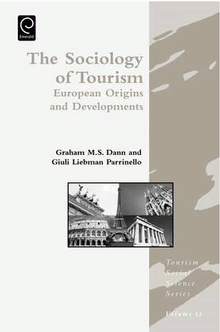 The Sociology of Tourism: European Origins and Developments
The Sociology of Tourism: European Origins and Developments
Edited by Graham M.S. Dann and Giuli Liebman Parrinello
(Hardback, 484 pp, Published Dec 2009, Emerald Group Publishing)
This is the latest volume in the Tourism Social Science Series and a result of a collective 3 year effort, borne out of the research committee on international tourism (RC 50) of the International Sociological Association. It summarises and translates for the English speaker, the work of continental European Tourism Sociologists and sheds light into the late 19th century, continental European roots, and 20th century development, with ups and downs caused by political turmoil and wars, of Tourism as an academic field. By 1895, mountain tourism was fully established and conferences on Tourism were already being held, with Georg Simmel founding father of Sociology was criticising the “industrialised consumption” of nature. The reader also learns about interesting historic facts relating to Tourism especially in the German and French chapters, including the dark origins of cheap mass tourism packages in Nazi Germany, but also how and when higher education programs were launched, or not launched as in the case of Spain, where Tourism, as we learn, was largely ignored as an academic field at least until the fall of the Franco regime. There are many references to the leisure-related writings of leading social theorists such as Saint-Simon, Simmel, Marx, Weber, Durkheim Bourdieu, and their many, but little known outside their own countries, tourism sociolologist followers around Europe.
The twelve contributors, leading tourism sociologists, were carefully chosen to geographically, culturally & socioeconomically constitute a representative sample of Europe including German-speaking countries, France, Italy, Poland, Former Yugoslavia, Scandinavia, Spain, Low Countries, Greece. The editors, have usefully summarised all contributions in the form of an introductory and concluding chapter also adding their own points of view.
The book greatly increases awareness about the quantity and quality of tourism-related research by European sociologists so that Tourism finds its proper place in European academia. It is particularly a exhaustive (and slightly exhausting) literature review reference for students of sociology keen on Tourism. There are extensive notes in each chapter, plus 84 pages of Author References, Subject Index (no Name Index however) and a chronological table of 20th century tourism theorists in the Europe countries analysed.
For more details and to order visit the publishers website
 Tourism, Power and Culture – Anthropological Insights
Tourism, Power and Culture – Anthropological Insights
Edited by Donald V.L. Macleod and James G. Carrier, Channel View Publications, Bristol, UK, December 2009
According to the editors the book originated in a 2007 meeting of the Association of Social Anthropologists of the UK and Commonwealth entitled “Thinking through Tourism” which found that there was a lack of anthropological research in Tourism, whereas the long-term focus and training of anthropologists, it was argued, could make them ideal observers of changes over a period of time in tourism destinations and good interpreters of indigenous views and cultural differences created by tourism development. Thus most of the book contributors are anthropologists specializing in tourism, with a refreshing outcome, as the book is lacking the dry economistic-managerialistic-marketistic approach found in many tourism volumes.
The book (219 pages with Index) is divided into 2 equal parts: (a) Tourism and the power struggle for resources, and (b) Tourism and culture, presentation, promotion and the manipulation of image.
The 1st part contains interesting case studies on:
- The struggle for the control of the water in Queensland, Australia between farmers and recreational users and environmental groups.
- The struggle for the control over the construction and reparation of houses in the world heritage site of Djenne, Mali between locals and Unesco.
- The competition between the promotion of colonial and pre-colonial heritage and anti-colonial struggles in La Gomera in the Canary Islands
- The Dominican Republic (suppression of African heritage in a museum)
- Dumfries and Galloway in Scotland (promotion of irrelevant image by the state agencies)
- Bali, Indonesia (lasting effect of terrorism on security perceptions and policies)
The 2nd part contains has some more interesting case studies:
- The Parara Paru community of Embera people in Panama and how tourism has ‘upgraded’ their image in the eyes of other Panamanians.
- The effect of cultural tourism on “black culture ”in Salvador da Bahia, Brazil and issues of authenticity.
- How Belize used Ecotourism and Cultural Tourism to form a national identity after the departure of the colonial power in 1981.
- Tourism problems in Negril, Jamaica such as environmental degradation, labour exploitation and rude tourist behavior and tourism-induced conflict between conservationists and the local fishermen community.
A good concluding chapter by Colin Michael Hall deals with the issue of Power in Tourism and rightly points out that there is a belated recognition in tourism studies that Power is a key issue, as power is linked to land (ownership) control and land availability is key to Tourism. And this he convincingly explains as a result of “a wider apolitical and often uncritical discourse that dominates most of tourist studies” and an underlying, erroneous perception – also a result of power in tourism one may add - that the main role of the study of tourism is “to prepare students for employment in the tourism industry”.
To fully appreciate this worthwhile book, which is densely written and certainly not introductory, readers with a tourism background must have extensive anthropological, sociological and political science knowledge but may be surprised that practical conclusions or policy recommendations are not offered in readily digested format. On the other hand, anthropologists will more easily derive value from the informative tourism case studies.
For more details & to order visit the publishers website
Place Branding – Glocal, Virtual and Physical Identities, Constructed, Imagined and Experienced.
Robert Govers & Frank Go, Palgrave Macmillan, Houndmills, Basingstoke, UK, July 2009
The book attempts to fill a void as an academic textbook in a relatively new subject that has just acquired its first journal (The Journal of Place Branding & Public Diplomacy, by the same publishers). The authors choose Dubai as a ‘signature case’ to explain in detail what place branding really involves and why it matters and to test their theories & methodologies in detecting place branding expectation & perception ‘gaps’ in visitors and hosts. Their choice is influenced by the deep knowledge of the emirate by one of the authors who resided there for four years.
The book is divided into 4 parts – Towards Place Branding (Short History), Place Brand Strategy (3 case studies, Dubai plus Zeeland (NL) and Flanders), Place Brand Performance (reference to Dubai & Zeeland), Place Brand Satisfaction (Netherlands & Dubai - perceived place image, how it is influenced by experience, background others, and temporary issues/ problems) last Conclusion. 269 pages plus Appendixes (very short recommended reading, extensive bibliography 17 pages), Name Index, Place Index. Contains 31 figures & 25 Tables. As any good textbook, each part begins with the goals of the authors while there is a meticulous summary at the end of each chapter.
There is also a philosophy & psychology literature review, however it is rather short and which not very well connected to the other chapters. That said, interesting concepts throughout the book include the ‘commoditization of culture’, ‘authenticity’, ‘individualism’, ‘individual perception of tourism authenticity’, ‘Americanization’, effects of crises on tourism, covert marketing, and the various ‘gaps’ as in brand strategy gap, when a place brand fails to match true place identity.
The book is certainly useful for Dubai enthusiasts thanks to the insider’s knowledge of Dubai, including the royal family’s involvement in spear-heading and managing tourism-brand-related organizations. We learn how Dubai became from a non-distinct refueling station for airlines flying from Europe to Asia in the early 1980s, into a tourism attraction: it was a conscious government decision to build a large-scale coastal resort hotel outside the city in the empty desert. It has been a state-planning and free-market dream (or nightmare) in one ever since with mega-projects now islands in the shape of palm trees and the world map, sort of Disneyland meets Singapore. Interesting facts are mentioned: 5-star hotels in Dubai use up to 225% more than their counterparts in Europe, there are very high per capita CO2 emissions while the effects on marine ecosystems from those artificial islands were not really considered beforehand.
Significantly, in relation to the book topic, we learn that Dubai does not have a place brand! And that “neither the image of Dubai or of the other selected cases is significantly affected by destination marketing and promotion. In fact (p.166) “the way Dubai projects its place imagery lacks creativity & cross-border thinking between actors” and “fails to reflect coherently in its true identity place”. The research also reveals the vast ignorance & indifference of most (business & leisure) visitors to Dubai about its traditional culture and heritage.
With Dubai occupying so many pages as the (negative example?) main case study, the rest of the book’s more positive case studies are a bit uneven, with the case-study on Flanders being courtesy of a Masters student, supervised by the author.
Surprisingly for a book dealing with place branding the authors seem genuinely concerned with the “ commoditization of destinations” and are critical of “ Western intermediaries & multinational management companies that want to exert cultural power and construct place identity through Tourism, as has happened in the case of Morocco” (p.252)
Following this criticism, the reader may have expected an ‘alternatives’ chapter, with alternative, direct democratic approaches to building a place brand (or alternatives to a brand altogether) - for example a local community voting to choose among proposed brands, or even better to develop it from the grassroots. Instead we read at the concluding thoughts the rather anticlimax opinion that after all place branding an affair for “place marketers, in consultation with government and private industry actors” (p.268.) and that “covert induced agents” work a lot better than paid advertising (p.268) (paid bloggers?)
But a national brand is not a corporate image sold to consumers, but one that should be respectful, acceptable and representative of the hosts, not of the “ experts”.
To conclude, after reading this useful & informative book, a tourism student will probably have strong doubts as to whether a place brand is really needed. And doubts are certainly useful for students. Professional readers with a branding background will probably appreciate the detailed and pleasant to read analysis. But Ecotourism proponents will probably focus on a positive side-product of this research: to “question the sustainability of the Dubai brand” long before the current global economic & tourism crisis kicked in.
For more details & to order visit the publishers website
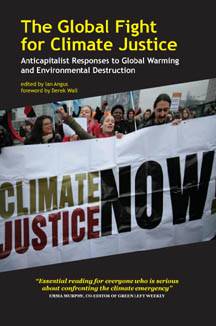 The Global Fight for Climate Justice
The Global Fight for Climate Justice
Edited by Ian Angus
284 pages, Publisher: Resistance Books, London, UK, July 2009
“From the standpoint of a higher economic form of society, private ownership of the globe by single individuals will appear quite as absurd as private ownership of one man by another. Even a whole society, a nation, or even all simultaneously existing societies taken together, are not the owners of the globe. They are only its possessors, its beneficiaries, and they must hand it down to succeeding generations in an improved condition” — Karl Marx
This stimulating book features a potent mix of 46 essays, talks and declarations new, recent and old, from famous politicians and lesser-known activists alike, tackling the issue of Climate Change and Climate Justice, not from the usual, apolitical, mainstream environmentalist angle, but from a left / ecosocialist viewpoint, one which considers global warming an issue of systemic 'oppression, exploitation & injustice'. The main conclusion of all articles is that ecological sustainability is incompatible with the current capitalist world model and that it will take much more than tinkering with the model to achieve it. Even if you do not agree with all the arguments and some of the ideologically-charged conclusions you will still find this collection useful in helping you re-evaluate some no-tears, environmentalism-lite solutions.
The discussion is argumentative and partisan, rather than academic or 'objective', as the authors are anything but 'ivory tower theorists'. Among them, Hugo Blanco, 1960s leader of the indigenous peasant movement in Peru, John Bellamy Foster (editor of the Monthly Review and author of the seminal “Marx's Ecology”), Joel Kovel (politician, writer & founder of the Ecosocialist International Network), Kevin Smith (author of the Carbon Neutral Myth – also see his article in ECOCLUB, Issue 92), Evo Morales (president of Bolivia) and Fidel Castro (no introduction required). The articles have been selected and expertly edited by Ian Angus, Editor of the Climate & Capitalism journal, who has also written and translated many of the articles in this compilation. The interesting foreword is by Derek Wall, former principal speaker of the Green Party of England and Wales
The chapter names are self-explanatory: Climate Emergency, Starving the Poor, False Explanations-Fals e Solutions, The Green Capitalism Fantasy, Privatizing the Atmosphere, Voices from the Global South, Building a Climate Emergency Movement, Ecosocialist Responses to Capitalist Ecocide. Most provocative articles include Fidel Castro's "Tomorrow Will be Too Late" containing his statement at the 1992 Rio Earth Summit, A 2008 Oxfam Report 'Climate Wrongs & Human Rights', “Magic Bullets: The Ethanol Scam and Carbon Capture & Storage”, “The Myth of the “Tragedy of the Commons” by Ian Angus, who refutes the 'sacred' Garrett Hardin neo-liberal parable that privatization of communally-managed lands, forests and resources, actually 'conserves' them, “The Failures of Green Economics” by Joel Kovel who criticises the Kyoto process' Clean Development Mechanism (“to the extent that the project succeeds, so does it fail, for the new wealth which has been created remains like capital everywhere, constantly seeking investment outlets and placing yet more burdens on ecosystems.”) and major environmental NGO's (“Capital is more than happy to enlist mainstream enviros as partners in the management of nature. Big environmental groups offer capital a threefold convenience: as legitimation, reminding the world that the system works; as control over popular dissent, a kind of sponge that sucks up and contains the ecological anxiety in the general population; and as rationalization, a useful governor to introduce some control and protect the system from its own worst tendencies, while ensuring the orderly flow of profits”). The “Sustainable Capitalism?” article by David Travis, points out that “part of the appeal of personal responsibility and moralising is precisely that it is individualistic: it enables the criticism of vast groups of people without specificity, it allows for the appearance of concern, outrage and various forms of progressive posturing, while at the same avoiding change and the tremendous ill will of interests aligned against it”.
(Does the word “stakeholder” ring a bell?). Terry Townsend (p. 113) points out that “in 2003 alone, US big business spent more than US$54.5 billion on advertising to convince people to consume more and more goods and services.4 This compares to the US government’s total education budget of US$76 billion in 2003.” Larry Lohmann demolishes Carbon Trading with just 6 Arguments, while Hugo Blanco offers a distinct southern perspective, the indigenous movements viewpoint on environmental justice from Peru. As Fidel Castro succinctly points out in his address (reproduced in the book) to the 1996 World Food Summit, “If 35,000 people – half of them children – are starving to death every day, why is it that in the developed countries olive groves are being torn down, cattle herds are being sacrificed and large amounts of money are being paid so that the land is kept unproductive?” One could add many more inconsistencies of the current system: at the same time that trillions of dollars are allocated to military budgets and security, the greatest insecurity is created by the way the current system is treating the planet, humanity and all other life forms, giving rise to hopelessness, violence and extremism.
The collection of essays and diatribes is informative and - deliberately - didactic. Most readers will be pleased to note some criticism (and self-criticism) on the (equally appalling) environmental record of the 'really-existing', bureaucratic socialist regimes of the 20th century. Ian Angus (p.216) notes that “...it is also true that during the 20th century socialists forgot or ignored that [ecological] tradition, supporting (and in some cases implementing) approaches to economic growth and development that were grossly harmful to the environment. Daniel Tanuro (p.240) of the Fourth International believes that “The countries of “really existing socialism” also bear a heavy responsibility: renouncing the world revolution, they aped productivism and copied capitalist technologies.”
Capitalism is portrayed throughout the book, as a uniform, irrational, ecological boogie that destroys everything in its path in the quest for profit, while 'green capitalism' , 'social entrepreneurship', 'corporate social responsibility' also get short shrift. As David Travis remarks (p.98) “Like it or not, capitalism is about extraction and profit, and when it comes to change, the sustainability movement has to decide to either shit or get off the pot”. Therefore, there is a sense that the ability of this 'evil' boogie to adapt and evolve may be (once more?) underestimated by the left. In fact, as Evo Morales has said (mentioned in the book) “Everything, absolutely everything, can be bought and sold and under capitalism. And even “climate change” itself has become a business”... We also read little about local & regional eco alternatives that would not require the 'final overthrow or the second coming' of world socialism. One hopes that in a second edition one could also find a more detailed discussion by major economic sector (tourism for example is not at all discussed) and country / geographical region.
The 289-page book includes many end-note references at the and of each article, and a short selection of books , website and blogs for further reading.
For more details and to order an autographed copy from the author click here
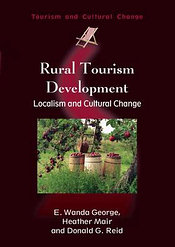 Rural Tourism Development Localism and Cultural Change
Rural Tourism Development Localism and Cultural Change
E. Wanda George, Heather Mair and Donald G. Reid
276 pages, Channel View Publications, Bristol, UK, 2009
This well-written book strikes a right balance between theory and practice, using case studies from rural communities which the authors have thoroughly researched. It succeeds in illustrating how four small communities in rural Canada have responded to the forces of change by undertaking tourism development as a mechanism to maintain a viable economy and a decent standard of living, and to link this experience with the bigger picture. The four communities are Canso in Nova Scotia which chose tourism when the Atlantic fishery collapsed in the early 1990s, Vulcan, Alberta where someone had the strange idea of developing Star-Trek related Tourism, Lunenburg, Nova Scotia, where UNESCO World Heritage Site designation triggered new cultural tourism demand and Port Stanley, Ontario, a traditional tourism destination, strategically positioned on the north shore of Lake Eerie, half way between Toronto and Detroit. The book is methodically structured, with a progressive stance, and following a political economy approach of rural tourism, the recurring theme being power relationships and the effects of globalisation on rural communities. All three authors have a rural community tourism research background across Canada and are able to talk with some authority on issues such as rural poverty, integration, social planning, the effects of neoliberal policies globalisation, gentrification & displacement of rural residents and commodification of culture. There are a number of interesting figures and tables and a useful index.
A possible weakness of the analysis is that "the community" seems to be a given, the authors do not examine in some detail what the community is composed of, decision-making processes and power relationships, although they do talk about their importance. The role and status of indigenous communities in relation to rural tourism is not covered, and ecotourism is not mentioned either. The style is usually normative ("should", "must") sometimes without accompanying data to back it, which may be strange to the academic reader, but is refreshingly clear to the reader. Memorable phrases include that "globalisation is both a cause and an effect of tourism". A bit tautological, but hard to disagree with the authors' conclusion that Tourism has to be appropriately planned, and tourism planning must involve all community stakeholders. Communities indeed 'need to be in control of both the process and outcome of tourism planning and development' and this book will certainly help them.
For more details & to order visit the publishers website
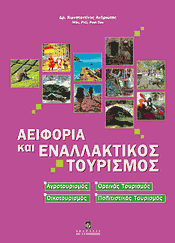 Sustainability & Alternative Tourism, Agrotourism, Ecotourism, Mountain Tourism, Cultural Tourism
Sustainability & Alternative Tourism, Agrotourism, Ecotourism, Mountain Tourism, Cultural Tourism
Konstantinos Andriotis
337 pages, Ekdoseis Stamouli S.A., Athens, Greece, 2008 (in Greek)
We normally do not review non-English books, however we made an exception as this is one of the first Greek academic textbooks on this topic, by an acclaimed author who is a Reader in Tourism & Recreation at Nottingham Trent University (UK) and an Editor of the International Journal of Tourism Policy.
Rather than denoting an alternative, ecological lifestyle, "Alternative Tourism" (Enallaktikos Tourismos) in Greece has come to signify any form of tourism that is not related to the usual fair of one week - GBP 199 - sun, sea and sand air charter packages. The author follows this convention in his analysis, but points out, correctly that "there is a wrong impression that all types of tourism that are not mass tourism can be classified as alternative". The book provides tidy, memorable definitions of the various forms of non-packaged tourism and terms such as sustainability, and then examines some of these forms, and the type of tourist that engages in them. There are many useful quotations from various other authors, but perhaps too many, leading to some cognitive dissonance, and some contradictions - at the end of a chapter generally praising sustainability we are left wondering if "sustainability" is a meaningful or feasible concept.
A common fallacy is that Ecotourism is equated with Nature Tourism and this is fortunately more or less avoided in the short chapter on Ecotourism. There are various insightful observations throughout the book that will hopefully register in the mind of students: the commodification of flora and fauna and culture included as a negative impact of tourism (p. 94), tourism development in many destinations and nations operates according to the principles of neocolonialism and full economic dependence to the west (p.89), small-scale tourism is sometimes an extra burden on rural women having to perform a triple role - household, agriculture, innkeeper (p.115), the smaller the tourism enterprise, the larger its contribution to local development (p.99) - which is perhaps a dubious statement unless we adopt the mainstream perception of the word development 'anaptyxi' (development), which always has positive connotations in the mind of the politician/bureaucrat. That said Dr Andriotis generally takes a centrist position, as expected in a textbook destined for general academic use, considering for example as 'extreme' views that call for limiting tourism development so as not to cause any ecological damage. Similarly he does not examine the case for de-growth in Tourism, such as demolishing or converting ageing hotels.
Spicing up the textbook, there are some perhaps hastily-written passages: some readers will be surprised by the neutral treatment of sex tourism (p.71 "it is unclear whether someone who visits South East Asia motivated by sex, can be classified as a sex tourist if they also visit an ancient temple"). Sex tourism is simply classified as one more alternative form, without any insight into the untold misery it generates and perpetuates. There is an allegation that tourism development interests were behind the summer 2007 fires in the west of Peloponnese, based on the reproduction of a public post in the Greek section of Indymedia (p.111). The "Women's Agrotourism Cooperatives" (Gynaikioi Agrotouristikoi Synetairismoi) movement is presented as an unqualified success (p.150) although problems are widely documented by other authors, journalists and the participants themselves, with many such cooperatives wavering. In general however the author is spot on with remarks such as that Agrotourism in Greece has not developed in farms but in modern, purpose-built lodges without local colour, no services are offered beyond accommodation, and that there is little cooperation between providers, although the latter is gradually changing through the development of various public and private networks. One could add many more things of course, such as the local level corruption & commodification & unsustainable projects generated by the availability and distribution of structural EU funds for Agrotourism.
There are appendixes containing relevant laws and case studies on the off-grid, deserted-village-turned-lodge Milia, the controversial Zakynthos National Marine Park, the rather imaginary "Olive Roads", and on a semi-alternative farm resort created by a large private chain. The case studies do not critically evaluate what happened, but present the results as best-case. But true, international, best-cases are unfortunately missing, although there are numerous brief references in the text. A good selection of international bibliography, a rather short Greek bibliography and an index are offered.
For a book dedicated to alternative tourism, the concluding remarks are a bit pessimistic / apologetic, but probably realistic in the case of Greece: mass (packaged) tourism is 'unavoidable', but some destinations that have all prerequisites for developing alternative tourism may just escape provided that they engage in 'a massive effort'. The book was written before the current economic crisis, and the resulting decline (but certainly not collapse) in Greek Tourism, that could have led to a different conclusion related to the higher resiliency of small-scale, community-based ecotourism in the time of capitalist crisis.
Overall, this is a methodical and thought-stimulating, introductory textbook for students, hapless bureaucrats confused by the various "tourisms", and hopeful for the many Greek politicians who still & erroneously consider and refer to Tourism as "Greece's heavy industry", a cliché that still leads to destructful, pro-growth plans and pharaonic projects.
For more details & to order visit the publishers website
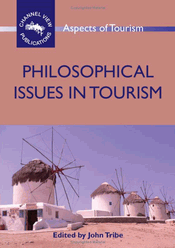 Philosophical Issues in Tourism
Philosophical Issues in Tourism
Edited by John Tribe
302 pages, Channel View Publications, Bristol, UK, 2009
Tourism and Leisure in general are considered 'light' subjects, thus they are not obvious topics for a deep philosophical or ontological discussion for most people or even for most tourism students, at a time that a conservative, market-driven research agenda dominates universities. Thus a knowledge & research gap exists in this area, and this book, a collective effort of 18 academics (two of whom have an academic training in Philosophy) edited by John Tribe, co-Chair of UNWTO's Education & Science Council, is a useful contribution. Rather than a discussion of major current and classical general philosophical theories and trends and how they may relate to Tourism, or a break down according to geography or tourism sector, each author focuses on various, not necessarily connected, specific issues, grouped into 4 sections, a well-written lengthy introduction that also accurately sums up the book, and three sections entitled "Truth: Reality, Knowledge & Disciplines", "Beauty: Well-Being, Aesthetics and Art", "Virtue: Ethics, Values and The Good Life", the latter also being the most interesting and controversial part.
The book's stronger points are the discussion of Tourism Ethics, Ontology and Epistemology; it is not so strong in covering political philosophy, economic, social & ideological issues or the case against Tourism. The viewpoints expressed on Ethics are quite varied, ranging from the moralist to the amoral (including a polemic of Ecotourism, entitled 'Against Ethical Tourism') and the writing style refreshingly varies from extra dry academic to populist. One of the most potent statements in this - largely apolitical - book is one by the editor who describes the current state of Tourism as 'Runaway Tourism... a tourism delivered in a largely uncontrolled neoliberal market environment'. We would have wished for a couple of chapters dedicated to philosophically analysing this statement with concrete examples, perhaps at the expense of some esoteric chapters such as the ones on aesthetics. More case studies, figures & images would have made the book easier to read -certainly not a book to take on a holiday - but plenty of food for thought for Tourism reseachers, and all those who understand that Tourism is much more than going on a holiday and are patient enough to read the book many times and methodically follow up the many good references & leads provided
For more details & to order visit the publishers website
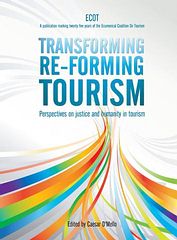 Transforming Re-Forming Tourism - Perspectives on justice & humanity in tourism
Transforming Re-Forming Tourism - Perspectives on justice & humanity in tourism
Edited by Caesar D'Mello
248 pages, Ecumenical Coalition on Tourism, Chiang Mai, Thailand, 2008
Marking the 25th anniversary of the Ecumenical Coalition On Tourism, a church-led NGO based in Thailand which campaigns for an Ethical Tourism, this highly-readable volume brings together a lot of writer talent, tourism knowledge & activism from around the world. Contributions from 29 authors are organised in 7 sections covering a great range of issues such as the lack of representation of women in Tourism, the very small progress of the mainstream tourism towards meeting the Millennium Development Goals, the neo-colonial & neoliberal aspects of mainstream Tourism and its intrinsic unsustainability, the problematic morality of Tourism from the Christian, Islamic and Buddhist viewpoints, the still-persisting phenomenon of sexual exploitation of minors by tourists in certain countries, the high-promises and shortcomings of pro-poor and community-based tourism, the futility of certification, and the misuse of Ecotourism and sustainable tourism. Besides convincingly arguing that Tourism is neither a panacea, nor a smoke-free industry, nor a guaranteed wealth generator, nor welcome by all communities (which should not be called "hosts" as the book points out), the book includes many shrewd if a bit cruel observations - such as the misuse of the Millennium Development Goals by UNWTO to advance even more Tourism Development - and should therefore find its place in the library of the serious Ecotourist and on the desk of the Tourism undergraduate as an introductory alternative textbook with interesting case study material. Ecotourism practitioners may not agree with some of the authors, especially those who seem to show some aversion towards all forms of Tourism, including sustainable ones, without necessarily producing the data to back this aversion. Academics may feel that what are essentially complex political-philosophical issues are discussed in a relatively casual, journalistic yet apolitical manner, without references to academic or political frameworks. The non-religious will appreciate that theology is kept at a minimum, but may observe that a critical examination of the role/participation of the Church and Religion in Tourism (and broadly in the economy) and its own cooperation or tolerance of the powerful tourism interests, local & multinational, that the book chastises is also absent. But overall this is a very useful book from a very useful, and refreshingly progressive faith-based initiative
For more details & to order visit http://www.ecotonline.org
Reinventure - How Travel Adventure Can Change Your Life
Carol Patterson
160 pages, Trafford Publishing, Victoria, BC, Canada, 2008
A personal, blog-style, light-hearted but detailed selection from the authors’ extensive worldwide, travel experiences. The author convincingly argues that travel, beyond transforming communities can also transform the lives of individual travellers, explaining that the same occurred for her with a “reinventure” from accountant to a leading ecotourism consultant. Forty short stories, including tales from or about friends working in tourism and the environment, are pleasant to read, with a subtle “moral of the story”. It does not really matter that they are not listed in any particular thematic, geographic or chronological order, although some seem to end abruptly as the reader is immersed in the action. Each story starts with a carefully chosen travel-related quote from a famous author, one of the best being a typically sardonic (and prophetic) one from Bernard Shaw which goes “I dislike feeling at home when I am abroad”. Academic readers and seasoned travellers aware of the many wrongs of and within Travel would probably expect a less exuberant and more critical approach, and more stories like the one about the Kenya Lodge employees only being able to see their relatives 6 weeks per year. However the author, better known for other works focusing on the business side of travel, aims in this book and succeeds, to reassure ordinary package travellers that it is safe for them to make the extra step and try independent, adventure and/or nature travel. Thus the book should prove a successful and useful example of travel pop psychology and self help through travel
For more details & to order visit http://www.reinventuretravel.com
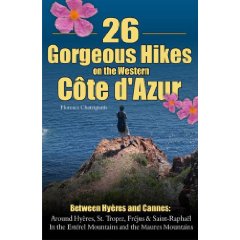 26 Gorgeous Hikes on the Western Cote d'Azur
26 Gorgeous Hikes on the Western Cote d'Azur
Florence Chatzigiannis
150 pages, AzurAlive, San Carlos, California, 2008
An alternative, pleasant to read, guide for experiencing a renown region, in an ecological way - hiking - a world away from the glitz and the crowds. Includes over 50 colour pictures and detailed maps of trails, including hiking time - most hikes can be completed in a half-day, distance, difficulty, elevation gain, best time to visit, as well as practical information such as contact details and links to further online information. The right size & weight for hikers, still manages to include interesting information on select flora such as Poseidonia and the Cork Oak, history and geology and guidelines on responsible hiking. The hikes themselves present great variety, from sea paths, gorges, lagoons, to Roman Aqueducts, medieval forts and monasteries, and other ancient ruins, to modern ruins and disaster sites such as the Malpasset Dam. The guide is written with those travelling by car in mind, perhaps in a future edition more information on how to reach the starting point of each trail could be provided for those hiking all the way from the train or bus station and also include some sort of rating for the hikes, for those who do not have many days at their disposal and need to pick just two or three out of the 26. The publishers should also consider replacing the glossy paper with recycled, to do justice to the content. We look forward to more hiking guides from the author!
For more details & to order visit http://www.azuralive.com/order.html
The Business of Ecotourism, 3rd Edition
Carol Patterson; Foreword by Delia & Mark Owens,
219 pages, Trafford Publishing, Victoria BC, 2007
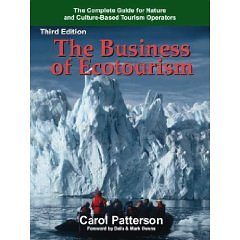 Calgary-based ecotourism consultant, and ECOCLUB Member, Carol Paterson, decided to revise this already useful book, first published in 1997, to expand on management challenges and chronic staff shortages, with two new sections aimed at people who want to make a career in Ecotourism, as a result of feedback that the author received. The ‘Business of Ecotourism’ provides sensible business advice for any small Ecotourism practitioner. It includes basic accounting and marketing templates, (the author being an experienced accountant before entering Ecotourism) particularly relevant in English-speaking countries and remembers to hint that Ecotourism is much more than a business, or business as usual. One of the most under-researched topics is the issue of risk in Ecotourism ventures, thus the chapter in Managing Business Risk (excerpt below) is very useful, as lack of adequate insurance cover and safety procedures is a gaping hole in many small tour operators as continuous accidents around the world show. We hope that this chapter can be expanded in future editions, as should the interesting but short chapter on industry standards and associations, that omits international networks such as ours. A number of successful practitioners have publically said that they have read previous editions of this book. Obviously a book can not by itself guarantee that an aspiring ecotourism entrepreneur will succeed, however we recommend that ambitious ecotourism students for one, before venturing out to do ‘their own thing’, purchase this clever and pleasant to read book so that they open their over-optimistic eyes to the main, potential dangers, not to be scared away but to be aware. This is a great manual, but it would be made even better with a chapter on the extra costs of being green and how to manage them. We would also love to see an ‘advanced’ version also aimed at researchers, investors and journalists with case studies naming names, possibly localised for specific destinations, and accompanied by a CD with multimedia examples, interactive exercises and case studies. That said, there is nothing rarer and more useful than plain talking and common sense, and this book is full of both. A lot of effort and attention has been invested for an appropriate text size and layout, with useful paragraph summaries and room for notes. Current, not so successful, ecotourism practitioners may also be able to (finally) detect what they are doing wrong – ranging from not “getting the right people for the job”, to not marketing their ‘product’ or forgetting to “build partnerships for success”, while they would have the added benefit of finding an excuse to contact the savvy author, one of the world’s leading ecotourism consultants, for more input!
Calgary-based ecotourism consultant, and ECOCLUB Member, Carol Paterson, decided to revise this already useful book, first published in 1997, to expand on management challenges and chronic staff shortages, with two new sections aimed at people who want to make a career in Ecotourism, as a result of feedback that the author received. The ‘Business of Ecotourism’ provides sensible business advice for any small Ecotourism practitioner. It includes basic accounting and marketing templates, (the author being an experienced accountant before entering Ecotourism) particularly relevant in English-speaking countries and remembers to hint that Ecotourism is much more than a business, or business as usual. One of the most under-researched topics is the issue of risk in Ecotourism ventures, thus the chapter in Managing Business Risk (excerpt below) is very useful, as lack of adequate insurance cover and safety procedures is a gaping hole in many small tour operators as continuous accidents around the world show. We hope that this chapter can be expanded in future editions, as should the interesting but short chapter on industry standards and associations, that omits international networks such as ours. A number of successful practitioners have publically said that they have read previous editions of this book. Obviously a book can not by itself guarantee that an aspiring ecotourism entrepreneur will succeed, however we recommend that ambitious ecotourism students for one, before venturing out to do ‘their own thing’, purchase this clever and pleasant to read book so that they open their over-optimistic eyes to the main, potential dangers, not to be scared away but to be aware. This is a great manual, but it would be made even better with a chapter on the extra costs of being green and how to manage them. We would also love to see an ‘advanced’ version also aimed at researchers, investors and journalists with case studies naming names, possibly localised for specific destinations, and accompanied by a CD with multimedia examples, interactive exercises and case studies. That said, there is nothing rarer and more useful than plain talking and common sense, and this book is full of both. A lot of effort and attention has been invested for an appropriate text size and layout, with useful paragraph summaries and room for notes. Current, not so successful, ecotourism practitioners may also be able to (finally) detect what they are doing wrong – ranging from not “getting the right people for the job”, to not marketing their ‘product’ or forgetting to “build partnerships for success”, while they would have the added benefit of finding an excuse to contact the savvy author, one of the world’s leading ecotourism consultants, for more input!
“Destination Brand Equity, a toolkit for marketing to visitors”
Alexandros Kouris
78 pages, Typophilia Thessaloniki, Greece, 2006, ISBN 960-7285-33-6
 This handy manual examines how destinations can differentiate themselves from the competition, and succeeed in capturing the imagination & memory of visitors through a strong brand. The author, Executive Director Designate of PRC Group, a leading marketing consultancy, draws on his vast experience with branding in Europe & Middle East to methodically examine the relatively new concept of destination brand equity, which he believes to be the central component of destination marketing. Mr Kouris proposes a destination equity model comprising of brand awareness, brand image, brand response and brand significance. The book offers specific research questions for conducting analysis & assessment, the writing is fittingly vibrant, the text is pleasantly interrupted by many relevant images of successful and not so successful destination brand equity examples, and there are useful references to online material. We did not find many references of how new trends such as sustainability & environmentalism in Tourism affect the substance and perception of destination branding, but maybe this is telling. We hope that future editions will be as handy and detailed but more extensive, include a recommended bibliography and perhaps an accompanying CD with multimedia examples. That said, this book is already very useful to tourism professionals but also to discerning tourists who would like to learn what ‘tricks’ destinations may throw at them to attract their attention!
This handy manual examines how destinations can differentiate themselves from the competition, and succeeed in capturing the imagination & memory of visitors through a strong brand. The author, Executive Director Designate of PRC Group, a leading marketing consultancy, draws on his vast experience with branding in Europe & Middle East to methodically examine the relatively new concept of destination brand equity, which he believes to be the central component of destination marketing. Mr Kouris proposes a destination equity model comprising of brand awareness, brand image, brand response and brand significance. The book offers specific research questions for conducting analysis & assessment, the writing is fittingly vibrant, the text is pleasantly interrupted by many relevant images of successful and not so successful destination brand equity examples, and there are useful references to online material. We did not find many references of how new trends such as sustainability & environmentalism in Tourism affect the substance and perception of destination branding, but maybe this is telling. We hope that future editions will be as handy and detailed but more extensive, include a recommended bibliography and perhaps an accompanying CD with multimedia examples. That said, this book is already very useful to tourism professionals but also to discerning tourists who would like to learn what ‘tricks’ destinations may throw at them to attract their attention!
Available from Typophila Publishing, 42 Polemi Street, 542 48 Thessaloniki, Greece, Tel: +30 2310 323 067, Fax: +30 2310 322 251. Email: niki [at] altervision.gr (Ms Niki Sioki)

